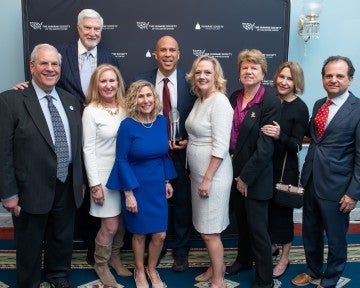There is another critical dimension to their work, however: stopping dangerous legislation and policy from taking hold. For much of 2023 that meant confronting the Ending Agricultural Trade Suppression (EATS) Act and related efforts by a recalcitrant faction within the pork industry trying to undermine the world’s strongest farm animal protection law, upheld by the U.S. Supreme Court last May: California’s Proposition 12, the popular ballot initiative that took a strong stand against cruel farm animal confinement, setting in-state standards for the production and sale of certain egg, veal and pork products.
This bill isn’t just about pork. The EATS Act could also potentially eliminate at least 1,000 crucial state laws pertaining to public health, safety and welfare, including measures designed to protect both humans and animals, like food safety and labor standards and prohibitions on the slaughter of horses for food. The push for the EATS Act is led by those in the pork industry who prefer to raise animals cheaply and cruelly. They are content to keep their welfare standards low, with utter disregard for animals’ needs, including having enough space to lie down and turn around. Increasingly, they are outliers, as many of the largest pork producers in the country have made strong practical and financial commitments to higher welfare standards for the raising of animals for food.
Every one of our 2023 Legislators of the Year powerfully opposed the EATS Act and similar legislation. Reps. Earl Blumenauer and Brian Fitzpatrick, along with Sen. Cory Booker, Sen. Alex Padilla and the late Sen. Dianne Feinstein, listened to and stood by their constituents, and by the animals, in this fight, as well as by the producers who have rejected or soon will reduce or abandon crate confinement. These forward-thinking lawmakers are sensitive to the moral and public health arguments against intensive confinement practices such as the gestation crate. Many producers have responded to clear expressions of public opposition to these cruel systems while also charting a new path for their industry. Government should safeguard these producers’ substantial investments in a more humane agriculture, one that minimizes animal suffering.
The market and the government owe nothing to those pork industry slackers whose arguments against Proposition 12 and similar measures can be readily dismissed as hogwash. As a recent Wall Street Journal article makes clear, pork’s problem is not Proposition 12. The industry is losing money and market share for other reasons. Practically everything that goes into raising hogs has grown more expensive: machinery, services, equipment, repairs, construction materials, feed supplements and labor. U.S. demand for pork products is down nearly 10% from 20 years ago, while the industry produces 25% more pork. It is an overproduction problem; supply now grossly exceeds demand, with the sector producing more pork than anyone wants to eat. The pork glut has shrunk producers’ profit margins to their lowest level in a quarter century, and the industry’s own projections make it plain that pork is losing younger consumers at a steady rate.
The defense of Proposition 12 and other measures threatened by the EATS Act was necessarily a priority for us and our political allies in the Congress this last year, and the fight continues. The prospect of the EATS Act or some related legislation surfacing in the Farm Bill is dangerously real, and we’re doing all that we can to block that kind of gambit. Having such effective and dedicated allies in both the House and the Senate is crucial to our success.
Our five top honorees have consistently championed animal protection measures across a range of concerns. Together, they are emblematic of a decisive trend in American public policy, the steady emergence of a body of law that takes deeper account of the needs and welfare of animals who are so wholly dependent on human mercy. They’re “100 percenters,” who have earned the highest ratings on our Humane Scorecard. And they’re 100% with us in the big fights, the ones that really count for animals.
- For his part, Rep. Blumenauer, who will retire at the end of this Congress, has built a remarkable legacy as co-chair of the Congressional Animal Protection Caucus, a leader for two decades on successfully moving the needle with bills and policies that touched on every aspect of animal protection from farm animals to wildlife to research to companion animals. He has rallied large numbers of colleagues each year to jointly call for key appropriations provisions to strengthen enforcement of animal welfare laws by the U.S. Department of Agriculture and the U.S. Food and Drug Administration. He was also our 2007 Legislator of the Year for his leadership in making animal fighting a felony-level crime.
- Rep. Fitzpatrick, another Congressional Animal Protection Caucus co-chair, has been an extraordinary advocate for our cause, too. He has been an energetic lead on both the Puppy Protection Act and the Prevent All Soring Tactics (PAST) Act, and he has led efforts to protect elephants, prohibit cruel hunting methods on national preserves in Alaska, and ban trophy hunting imports. He also played a key role in the passage of the Big Cat Public Safety Act, a distinction that led to his recognition as a 2022 Legislator of the Year.
- Sen. Feinstein’s dedication to our work was exceptional. Throughout her long career in the Senate, in addition to leading the charge on intensive confinement, she was a strong champion on a host of humane issues, including wildlife trafficking, horse slaughter, “downed” veal calves too sick or injured to walk and the plight of captive marine mammals, a record which led to her being honored as a 2016 Legislator of the Year.
- Sen. Padilla, serving in his first full term in the Senate, has distinguished himself as a committed ally, especially in efforts to protect wildlife. As chairman of the Senate Subcommittee on Fisheries, Water and Wildlife, he held a hearing on improving wildlife migration corridors. He has been stalwart in defense of the Endangered Species Act in the face of many threats and, citing the decline of wildlife populations over the past 50 years, he has called upon the U.S. Senate to ratify the United Nations Convention on Biological Diversity and bring the U.S. in as a formal party.
- As for Sen. Booker, he is a determined leader on animal welfare in the Senate. He has as deep an understanding of our issues and legislative needs as anyone on Capitol Hill, and his leadership on bills concerning development of non-animal testing methods and humane cosmetics, shark fin sales, wildlife trade and trafficking, endangered species, dog meat, and the cruelties of intensive confinement agriculture resulted in his being honored as a Legislator of the Year in both 2016 and 2021.





